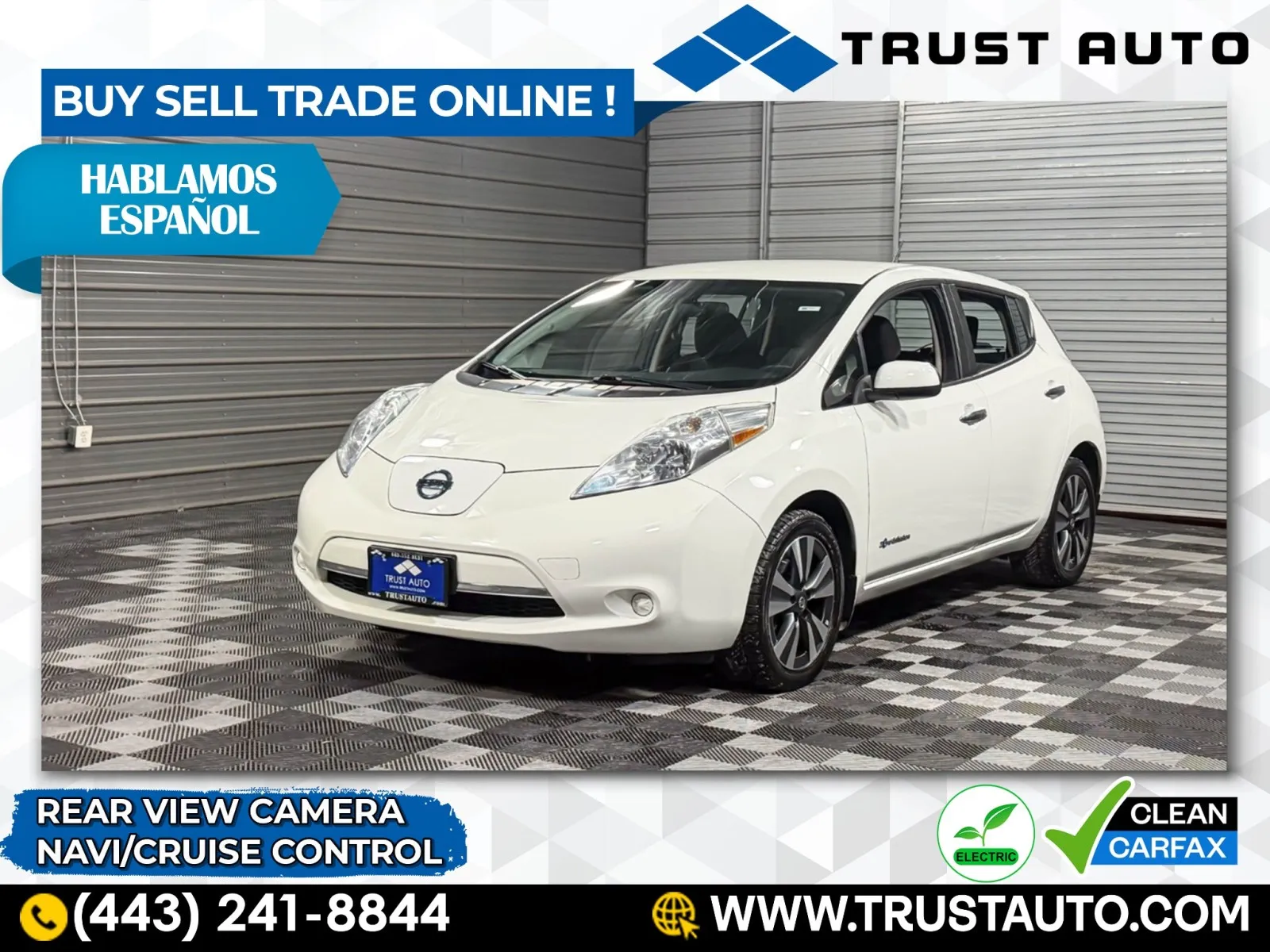46 Terms To Know Before Buying A Hybrid Or Electric Vehicle
Table of Contents
- 46 Terms To Know Before Buying A Hybrid Or Electric Vehicle
- EVs and PHEVs Terms to Know
- General Hybrid/Electric Vehicle Terms (terms that apply to both Hybrids and EVs)
- BATTERY RELATED COMMON TERMS:
- CHARGING RELATED TERMS:
- ADDITIONAL TERMS:
- Hybrid-Only Terms
- EV-Only Terms
- Buying a Used Hybrid Car or Electric Vehicle at Trust Auto

46 Terms To Know Before Buying A Hybrid Or Electric Vehicle
The mechanics of hybrid and electric vehicles are unlike those used in conventional gas-powered automobiles. These different systems have unique terms that you need to be familiar with when considering one for purchase.
Here is a list of the terms you need to know before buying a hybrid or electric vehicle (EV). We’ll do our best to avoid overly technical explanations.
EVs and PHEVs Terms to Know
- AC: Alternating Current is a type of current that reverses its direction multiple times at regular intervals.
- Amp: An Amp or Ampere is the SI unit of electric current. It is the measure of charge passing through a point of a circuit per unit time. An amp is measured as one coulomb of charge per second. SI refers to the International Systems of Units.
- DC: Direct Current is a type of current that has one-directional flow. Batteries store current in DC form. DC is also used for fast-charging applications.
- kW: Kilowatt is a unit of measuring power where kilo = 1000 and watt is the SI unit of power. 1kW = 1000 watts. 1 kW is also considered as 1 unit of electric power.
- kWh: Kilowatt-hour is the amount of kilo electrical power used in an hour. 1kWh means 1kW of electrical power or 1 unit of electrical energy is used in 1 hour.
- mpKwh: Miles Per Kilowatt-hour simply means miles you can go per kilowatt-hour. It is a unit to measure fuel economy in electric cars. Simply said, it’s a way to determine range. Say you have 10kWh of battery left and you drive at 5mpkWh, you will have a range of 50 miles.
- RPH: Range per Hour is a way to measure the amount of range you would add to your EV/PHEV in 1 hour.
- MPGe: Miles per Gallon equivalent tells you about the amount of electrical energy equivalent to the energy produced by a gallon of fuel. As per government standard, 33.7kWh = energy produced by 1 gallon of fuel. 100MPGe = 100 miles range in 33.7kWh.
- TOU: Time of Use is a new type of EV rate determined based on the time of day, day of the week, and time of year. Peak costs are set in the late afternoon or during peak hours/working days in summer and low in the morning, night, or winter.
General Hybrid/Electric Vehicle Terms (terms that apply to both Hybrids and EVs)
BATTERY RELATED COMMON TERMS:
- LIB: Lithium-ion Battery is the most common type of battery used in cars. These batteries have a great energy density, fast charging capacity, and they last for a long time. Ideally, a Li-ion battery only loses 20% of efficiency after ten years, but real-world conditions may affect this projection.
- EVB: Electric Vehicle Battery simply refers to the batteries that are used in EVs.
- BMS: Battery Management System is a system designed to manage and monitor battery packs inside EVs. It also allows users to monitor individual cells inside battery packs and update them on different parameters and conditions.
- VRLA: Valve-regulated Lead-acid battery is a rechargeable lead-acid battery.
- NiMH: Ni-Metal Hydride is a type of battery that is less reliable and frequently used in first-gen EVs and HEVs to store electricity. LIBs now replace them.
- Molten Salt Batteries: Batteries that use molten salt as electrolytes. A potential solution for extended Range.
- Range: Range is the distance an EV/PHEV can travel on pure electricity before it needs to be recharged. It is also referred to as All-Electric Range or AER. The current average range of a full-electric vehicle is around 181 miles, but this is increasing as newer models are released with greater ranges.
- Range Anxiety: Range Anxiety is the fear or stress of running out of battery power before reaching the destination.
- Regenerative Braking: A type of braking system that creates electric power when brakes are applied. This power is sent back to the batteries so it can be used again.
CHARGING RELATED TERMS:
- Charging Point: A point where the EV/PHEV charger is located for the vehicle to be charged.
- Charging Station: A public/private infrastructure with multiple charging points. Similar to a fuel station but for plug-in hybrid and electric vehicles only.
- Connector: A device used to connect the charger with the vehicle.
- Type 1 Plug: A type of connector with a single-phase plug that allows up to 7.4kW of charging level.
- Type 2 Plug: A triple-phase connector that allows charging power levels up to 22 kWh in private and 43 kWh in public charging places.
- IEC 62196: A particular type of connector called Mennekes used to charge electric vehicles in Europe.
- JEVS G105-1993 or CHAdeMO PLUG: A special type of connector designed to fast charge EVs by supplying 62.5 kWh. These are primarily used in Japan.
- SAE-J1772: SAE-J1772 is the standard for connectors in North America. This standard includes physical, functional, and performance requirements for charging plug-in hybrid or electric vehicles.
- SAE COMBO/CCS: SAE COMBO, also known as a Combined Charging System, is an upgraded version of the Type 2 plug that supports quick charging through AC or DC with power levels up to 170 kWh.
- Level 1 Charging: A slow charging process that uses AC to charge through 120-volt outlets (normal household current). It is a portable charging system that can be carried to different places with the vehicle itself, just like a smartphone charger.
- Level 2 Charging: An upgraded charging system that offers a 240-volt supply similar to an electric oven or clothes dryer.
- Level 3 Charging/DC Fast Charging: A fast-charging system that uses direct current as a source of power. These chargers can charge a vehicle in only 30 mins but are expensive to operate and less common in the market.
ADDITIONAL TERMS:
- EVSE: Electric Vehicle Supply Equipment is a safety protocol allowing two-way communication between the vehicle and the charging station. Its job is to ensure the safe and well-managed charging of plug-in hybrid and electric vehicles.
- CCID: Charge Circuit Interrupting Device is a safety system inbuilt inside the EVSE to prevent people from getting electrocuted from the charger.
- V2G: Vehicle-to-Grid is a system that enables a plug-in hybrid or electric vehicle to transfer power from car batteries to the grid or home. This tech helps run home appliances through EVs at times of blackout. Nissan Leaf, Kia Soul, Mitsubishi Outlander are EVs with such capabilities.
- WLTP: Worldwide Harmonized Light Vehicle Test Procedure tests a vehicle’s efficiency or range for electric power vehicles. It provides data on how far a car can go with a full tank or full charge. The U.S. Environmental Protection Agency requires a different testing procedure that frequently produces more conservative results.
Hybrid-Only Terms
- HEV: Hybrid Electric Vehicles are electric vehicles that combine an internal combustion engine with an electric motor.
- FHEV: Full Hybrid Electric Vehicle is a type of HEV that can run either independently on a combustion engine or electric motor or work together using a combination of both.
- PHEV: A Plug-in Hybrid Electric Vehicle is a type of HEV with a set of battery packs charged through an external power source. PHEVs have both an internal combustion engine and an electric motor powered by fuel and electricity, respectively.
- MHEV: Mild Hybrid Electric Vehicle is a type of HEV that also has battery packs to store electrical energy but does not require charging. These vehicles use regenerative braking to charge the batteries. These batteries reduce the load on the combustion engine by powering electronics and helping with start/stop functions.
- EREV: Extended Range Electric vehicles are electric vehicles with extended electric range. These vehicles have an onboard generator to create backup power when the primary power source is depleted. For instance, the BMW i3’s Range Extender is an example of this technology.
- ICE: Internal Combustion engines are power plants that burn fuel (such as gasoline or Diesel) to produce power.
EV-Only Terms
- EV: Electronic Vehicle is a type of vehicle that is powered by electricity. These vehicles only have an electric motor as a drivetrain powered by batteries or fuel cells.
- BEV: Battery-powered Electronic Vehicle is a type of EV that gets all its power purely from batteries. An all-electric car is called BEV. Tesla cars, Audi E-Tron, and Chevrolet Bolt are some examples.
- FCEV: Fuel Cell Electric vehicles are EVs that use a fuel cell to produce energy. These vehicles burn hydrogen as a fuel to produce electricity that powers the electric motors to run the car. These vehicles are more efficient than internal combustion engines and only emit water vapor as exhaust. Honda FCX Clarity, Toyota Mirai, and the Hyundai ix35 Fuel Cell are some mass-produced FCEVs.
- Tesla Supercharger: Since Tesla is a major EV manufacturer, it offers a supercharging system only to Tesla owners to fast charge their vehicles. The Tesla Supercharger provides 120kW of electric supply to add up to 200 miles of range in just 15 minutes.
- ZEV: Zero-Emission Vehicles are those vehicles that produce zero harmful emissions. All BEVs and FCEVs are considered ZEV vehicles.
- NEV: Neighborhood Electric Vehicles are BEVs that are limited to an average speed of 25mph. These EVs are mainly made to be driven on streets or for shorter distances. NEVs are compact, under 3000 lbs, made chiefly for two people, and have a range of 50 miles or above.
Check out all the used hybrid cars and electric vehicles for sale at Trust Auto. Please note that all vehicles are subject to prior sale.
Buying a Used Hybrid Car or Electric Vehicle at Trust Auto
Buying an environmentally friendly car doesn’t have to be confusing. The HEV and EV experts at Trust Auto can walk you through all the details. Our extensive collection of low-emission and zero-emission cars includes models from Tesla , T o yota , BMW , and others. Be sure to look at our complete online inventory of premium cars, SUVs, and trucks.
Shopping for a used EV in Columbia? Buying a used hybrid in Eldersburg? Then Trust Auto in Sykesville is the place to visit for the best-used hybrid and electric vehicles. EV shoppers from Virginia and Washington, DC, also appreciate our convenient location. Looking for a used truck in Pennsylvania? Searching for a used SUV in New York? Our quick and simple online shopping is a great option, too. Our virtual car buying service is handy even if you live in Randallstown, Pikesville, or Towson.
From Baltimore and beyond, discover why people come from far and wide to experience the Trust Auto difference. Click, call or visit us today.



